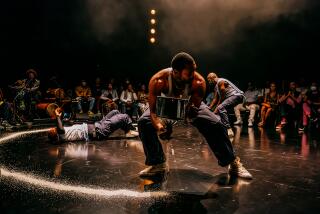‘Cuttin’ Up’ is as witty as it is wise
Charles Randolph-Wright took on a Herculean task when he set out to dramatize Craig Marberry’s book “Cuttin’ Up: Wit and Wisdom From Black Barber Shops.” The bestseller distills a series of interviews that the author conducted in a wide spectrum of black-owned and operated American barbershops -- for generations, the de facto community centers where African American men have gathered to swap stories, talk trash and just let their hair down, if you’ll pardon the pun.
“Cuttin’ Up,” now at the Pasadena Playhouse, broadly samples the far-flung interchanges in Marberry’s book, random snippets that Randolph-Wright attempts to cobble together into a cohesive theatrical whole. He doesn’t always succeed in that purpose, but if his sprawling, colorful portrait occasionally drips off the canvas, it is vividly rendered, as is Israel Hicks’ cheerfully over-the-top staging, which is so infectiously ebullient that we forgive its lapses.
Randolph-Wright takes his generalized material and sets it in one specific milieu -- in this case, Howard’s Barber Shop, owned and operated by Howard (Adolphus Ward), the elder statesman and spiritual center of the piece. Howard is a powerful role model for his community in general and the younger barbers on his staff in particular, including Rudy (Dorian Logan), a comical hip-hopper who is still trying to grow into manhood, and Andre (Darryl Alan Reed), a peripatetic, mysterious man who never sticks around one place too long.
An inveterate storyteller, Andre also functions as a convenient dramatic device. In fact, Andre’s tales about working in various barbershops across the U.S. allow Randolph-Wright to recapitulate other stories from various characters farther afield. Bill Grimmette, Harvy Blanks, Maceo Oliver, Jacques C. Smith and Iona Morris (the sole woman in the cast) play those characters, which include gun-toting gangbangers, preening celebrity preachers and forlorn single mothers. After all, Howard’s Barber Shop is, first and foremost, an egalitarian institution where the classes mingle freely and the roots run deep.
Michael Carnahan’s magnificently detailed set, subtly lighted by Phil Monat, is a completely believable microcosm -- so much so that we feel like customers waiting for the next available chair. Music is key to James C. Swonger’s propulsive sound design, which spans the generational divide from mellow jazz to raw rap. David Kay Mickelsen’s clever costumes range from the perfectly ordinary to the astonishing -- outfits that seem more like plumage than clothing. For these men, dress is often an extension of self, the outward trappings that proclaim their worth and substance to those who would doubt it.
If Randolph-Wright’s play has a persistent fault, it’s a tendency toward bathos. Randolph-Wright obviously intends no less than a retrospective of the African American experience, with echoes going back all the way to the days of slavery. But by touching on all subjects -- the AIDS epidemic, the Iraq War, even the murder of Emmett Till -- Randolph-Wright diffuses the emotional effect. Hicks could have helped gloss over this failing by reining in his actors, who tend to over-emote during the serious scenes.
Largely, though, the background material is fascinating, a crash course in black history from the obvious to the fascinatingly arcane. And mostly the cast delights with exaggerated performances that know no bounds. When these characters break into song or spontaneous dance, we feel the energy pulsing from the stage in waves.
A titan among these larger-than-life characters, Blanks scores the hugest laughs with his impeccable comic timing. Reed infuses a balancing realism into the heightened proceedings, while Ward, the calm center of this rollicking storm, is unassailable in his wisdom and dignity.
*
‘Cuttin’ Up’
Where: Pasadena Playhouse, 39 S. El Molino Ave., Pasadena
When: 8 p.m. Tuesdays through Fridays, 4 and 8 p.m. Saturdays, 2 and 7 p.m. Sundays. Some exceptions.
Ends: April 15
Price: $31 to $60
Contact: (626) 356-PLAY, www.pasadenaplayhouse.org
Running time: 2 hour, 15 minutes
More to Read
The biggest entertainment stories
Get our big stories about Hollywood, film, television, music, arts, culture and more right in your inbox as soon as they publish.
You may occasionally receive promotional content from the Los Angeles Times.










